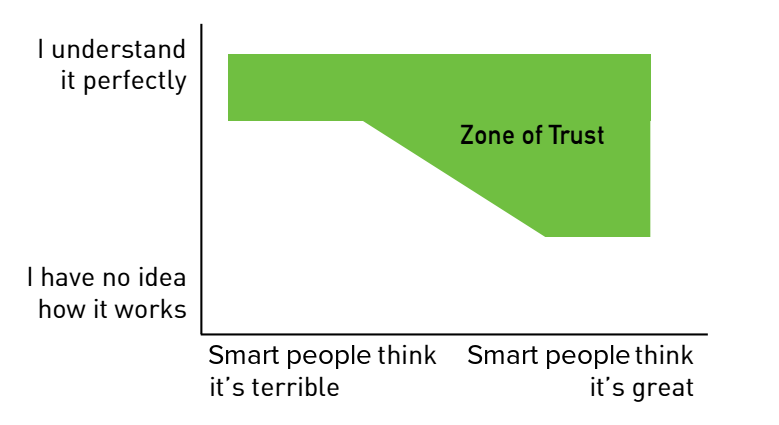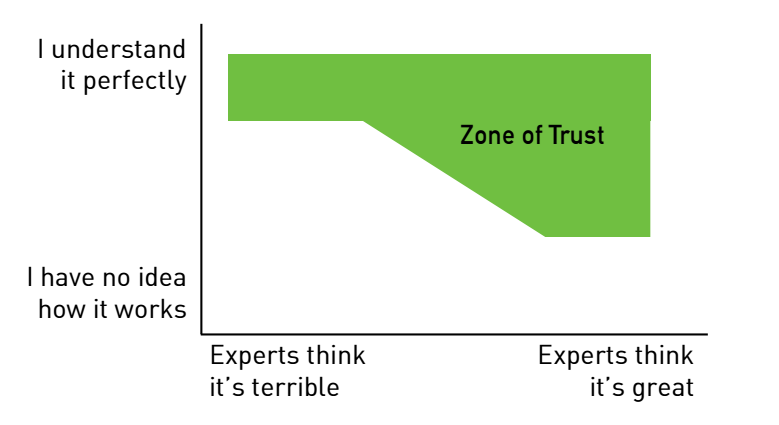Say “experts” instead of “smart people”
In his keynote talk at the PaPoC workshop at EuroSys last week, Peter Bourgon described a ha-ha-only-serious metric for whether an idea could be trusted for use in production:

During his talk, Peter made several offhand comments about how he wasn’t as “smart” as the academics in the room. He held up CRDTs as an example of an idea in the sweet spot for trust – one that he trusted based in part on the opinion of “smart people” like those present. The talk was very well done, but the phrase “smart people” bothered me, enough that I picked on Peter about it in the Q&A after the talk. Happily, he agreed so strongly with me that he changed the slide right away.
What’s so bad about “smart people”? Here’s the thing. People who come up with stuff like CRDTs understand hard things, sure, but not because they are any smarter than those who don’t. They understand hard things because, as researchers, trying to understand hard things is their full-time job. In fact, such a job is probably easier to get than, say, Peter Bourgon’s job.1 If you can live on a grad-student stipend and face a steady stream of rejections, you too can probably have “trying to understand hard things” be your full-time job for a while.
Some of the people who do that – by no means the “smartest” ones – end up with a Ph.D. via a process that has a lot to do with luck and stubbornness and very little to do with how smart one is. (About half of the people I started grad school with had dropped out by the time I defended my Ph.D., and I can guarantee you that those of us who stayed are no smarter than those who left.) If they continue to work full-time on trying to understand hard things, then eventually, sooner or later, they’ll probably come to understand some of those things. In return, they give up, at least for a while, on the chance to pursue deep understanding of any number of other things. They may also give up, at least for a while, on the chance to build things like Peter does.
So, if you choose to describe someone who has expertise in a certain area as “smart”, you’re discounting the hard work they did, and the difficult choices and sacrifices they made, in order to gain that specific expertise. By attributing whatever success they’ve had in understanding hard things to their being smart, you take away their own agency in the matter.
Especially for a young person, or someone else without a strong sense of self, being labeled “smart” not only disregards their agency, but also reinforces a worldview they may have in which being “smart” is an obligation they have to live up to. If I am told over and over that I am smart, then it gets harder and harder for me to publicly admit to not knowing the things I don’t know. In that sense, being called “smart” actually does harm by inhibiting learning. If I’m expected to already know everything, how can I learn? I’d rather be acknowledged for the expertise I’ve developed in a few areas, and allowed to be a beginner in others.

Peter decided to replace “smart people” with “experts”, which I think is both more accurate and less harmful. If you’re tempted to call someone “smart” because of some knowledge they have that you don’t, consider whether “expert” isn’t a better choice.
Thanks to Laura Lindzey, Scott Feeney, Michael Arntzenius, Dan Luu, Tim Chevalier, and Peter Bourgon for their feedback on drafts of this post.
-
When I applied to grad school, I had no publications, no research experience, no recommendations from star researchers, and a bunch of Bs and Cs in math and CS courses on my undergrad transcript. I didn’t have much serious programming experience to speak of, either. I still got into (one!) grad school. Chances are that if you’re reading this blog post, you’re at least as qualified as I was at the time. ↩

Comments